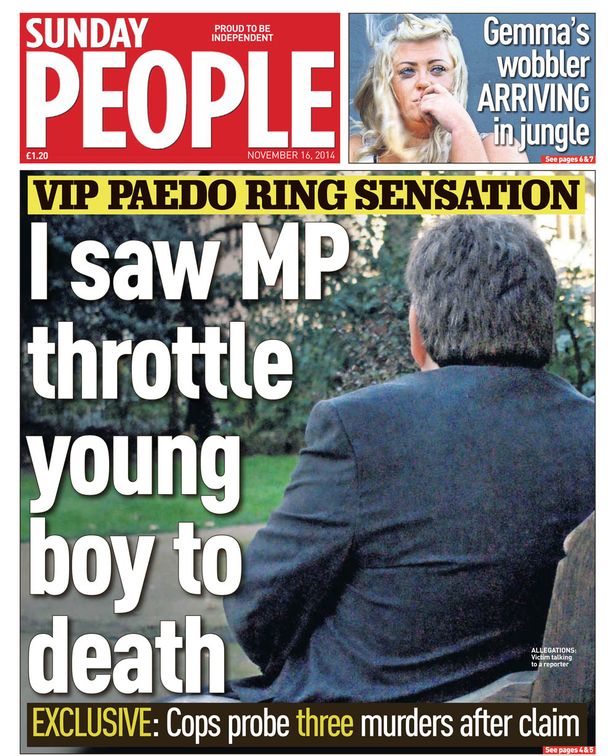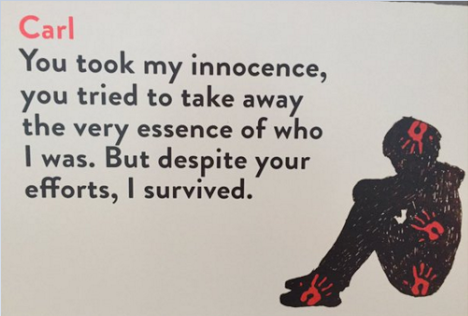A blurb for a recent episode of the Richie Allen Show:
Richie is joined by former Detective Chief Constable [sic – should be “Detective Constable”] Maggie Oliver and former barrister and immigration judge Michael Shrimpton. Former detective Maggie Oliver joins Richie to chat about her outstanding memoir “Survivors – Fighting For Justice.” When detective Maggie Oliver first discovered that children as young as 10 were being groomed, abused and trafficked for sex by gangs of men in the Rochdale area, she felt like a lonely voice calling for people to act. Banging on closed doors, it seemed that nobody was able or willing to help her save these vulnerable girls, but she couldn’t just sit back while countless lives were being destroyed forever in plain sight. Instead, she launched a one-woman campaign to bring down these sickening gangs. It’s a heart-breaking and shocking story of how the actions of one determined detective secured convictions in what is now one of the most notorious grooming cases in the UK.
A convicted paedophile has been found guilty of making false allegations of murder and child sexual abuse against a string of public figures. Carl Beech, 51, from Gloucester, was found guilty of 12 counts of perverting the course of justice and one of fraud. His lies led to a £2m Metropolitan Police investigation which ended in no arrests or charges being made. Former barrister and intelligence expert Michael Shrimpton tells Richie why he believes Car Beech was a “put up job” meaning, that he is a smokescreen being used to protect real VIP pedophiles.
There has been a flurry of news reports about Oliver in recent weeks, due both to her memoir and the recent creation of her Maggie Oliver Foundation. Her public stock is high – she is not just a household name and respected public figure but a “national treasure”, recently described in the Daily Mail as “the real angel of the north”.
So why is she lending her time and her credibility to Richie Allen, the host of a conspiracy podcast whose guests have included anti-vaccine activist Andrew Wakefield, Sabine McNeill (since imprisoned over her role in the Hampstead Satanic Ritual Abuse hoax, in which she targeted innocent parents), Liz Crokin (who used her appearance to denounce “rampant” Jewish paedophilia) and the far-right activist Mark Collett (who was invited on “to talk about the EU Parliamentary election results”)? Allen believes in all-powerful “Rothschild Zionists” as an explanation for developments in world affairs (a concept I previously discussed here), and one episode of his show comes with the title “The Rothschilds and Their Subsidiaries Own Literally Everything On Planet Earth”. Marlon Solomon has noted that Allen chose 27 January, which is Holocaust Memorial Day, to invite the Holocaust denier Nicholas Kollerstrom onto his programme.
Perhaps Oliver takes the view that she should accept any interview request that comes along to promote her book and her cause, but Allen is going to get far more out of this than she will, and the effect is to mainstream poisonous conspiracy thinking. Pairing her on the show with the absurd Michael Shrimpton (who, incidentally, has a recent conviction for possessing indecent images of boys) adds to the degradation of her work. There is nothing in the Carl Beech case that suddenly makes more sense if a “put up job” is posited, and this convergence between concerns about “grooming gangs” and “VIP abuse rings” conspiracy mongering may yet take society into new and even darker territory, despite Beech’s conviction (I discussed how the conspiracy milieu reacted to the verdict here).
Oliver has referred to her appearance on the show via a Re-Tweet of one Richard Willett, whose Brick in the Wall Media company is making a documentary about her and apparently provides video services for her foundation. It seems likely that Willett facilitated her appearance – Willett was himself recently a Richie Allen guest, and someone else he has made a documentary about (Alex Smith, aka the hypnotist Jonathan Royle) was on just yesterday. Willett is a self-described conspiracy theorist, and he also has his own podcast, called Glitch in the Code. A recent guest was Henry Makow, author of Illuminati: The Cult that Hijacked the World (“Masonic and Jewish bankers who finagled a monopoly over government credit”). On Twitter, Willett claims that Apple and Google apps contain Masonic and occult symbolism; he also argues that the US presidency is a “puppet of the banking families… Rothschild zionism”, and that JFK was shot because he resisted this.
This is not the first time I have raised concerns about Oliver’s association with the conspiracy fringe – last summer she was filmed by Anna Brees expressing her enthusiasm for Jon Wedger. This hasn’t been any obvious interaction in recent months, and I had hoped that she had thought better of being linked with someone who promotes wild Satanic Ritual Abuse allegations.
Excurcus: Maggie Oliver and the tabloids
Oliver’s recent timeline also shows a willingness to promote tabloid talking-points without much reflection. For example, the Sun recently mocked up a cover of Vogue to feature Oliver and some other women in public life, as a rebuke to the choices made by Meghan, Duchess of Sussex for her guest editorship of the magazine. Oliver promoted this, and the Sun‘s blurb appears pinned on her timeline as if in her own words: “Meghan Markle put leftie pals on Vogue cover, here’s who she should have picked instead”.
Meanwhile, the Sunday Mirror has returned to its Telford campaign, which I previously discussed here. A new report claims that in 2010 the Conservative-run council at Telford had turned down a grant from “the Daphne project [= the Daphne II Funding Programme], a European initiative aimed at combating violence against women and children”, over supplemental costs that the council would have had to provide. The paper claims that accepting the grant would have saved “hundreds” of girls in the town, and it includes the detail:
Others feared the council was scared to upset minority groups, as a large number of perpetrators came from the Pakistani heritage community.
We don’t know who these “others” are, and the phrase “the council was scared to upset minority groups, as a large number of perpetrators came from the Pakistani heritage community” was presented to Oliver by a user on Twitter as if this has been positively established as the reason why the grant was declined. Oliver took this at face value, RTing the partial quote and declaring “Political correctness has a lot to answer for. What happened to the law of the land?” This willingness to shoot from the hip with a damning judgement before the facts have been established is likely to have been noted by various bad actors.
Filed under: Uncategorized | Leave a comment »




